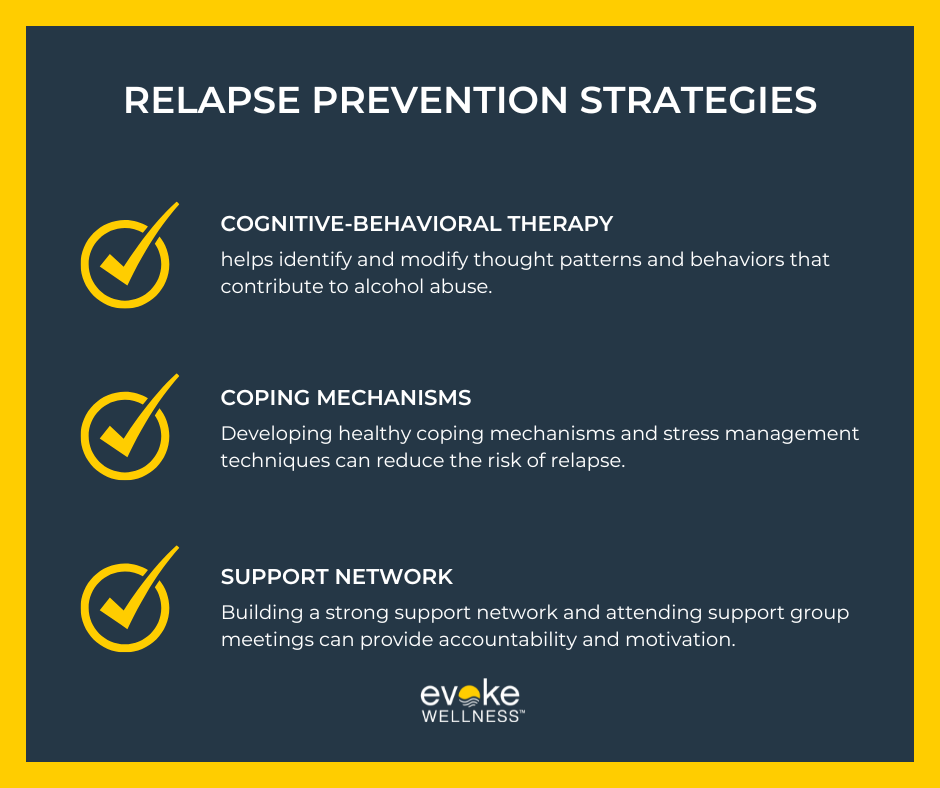If you’re considering quitting alcohol, understanding the withdrawal process is crucial for a safe and successful recovery. Alcohol withdrawal can be a challenging and potentially dangerous experience, requiring professional medical supervision. At Evoke Wellness at Miramar, we recognize the complexities of alcohol detoxification and are committed to guiding you through this critical phase of your journey to sobriety. This article will explore the symptoms of alcohol withdrawal, the importance of medically supervised detox, and the latest research on effective treatment approaches. By equipping yourself with knowledge and seeking appropriate care, you can navigate the detox process safely and lay the foundation for long-term recovery.
Together, let’s embrace the journey to recovery and the promise of a new beginning. Call us at (833) 819-6066 today or reach out online.
Understanding Alcohol Withdrawal Symptoms
Physical Symptoms
When quitting alcohol abruptly, the body goes into shock as it adjusts to functioning without the depressant effects. Severe physical withdrawal symptoms typically appear within 6-12 hours after the last drink. These can include nausea, vomiting, sweating, tremors, and rapid heartbeat. In the most extreme cases, life-threatening complications like seizures and delirium tremens (DTs) may occur.
Psychological Effects
Alcohol withdrawal also has profound psychological impacts. Many individuals experience intense anxiety, irritability, insomnia, and even depression in the days and weeks after quitting drinking. These symptoms stem from the brain’s dependence on alcohol and the disruption to neurotransmitter systems that regulate mood.
Duration and Severity
The intensity of alcohol withdrawal varies based on factors like the severity of alcohol use disorder (AUD), overall health status, and any co-occurring conditions. While acute withdrawal typically lasts 5-7 days, some individuals develop post-acute withdrawal syndrome (PAWS) with lingering psychological effects like anxiety, depression, and cognitive impairment for months afterward.
Professional Detox
Attempting to quit drinking alone can be extremely dangerous due to the unpredictable nature of withdrawal. Medically-supervised detox at an accredited facility provides around-the-clock care and medications to safely manage symptoms. This significantly reduces health risks, improves treatment completion rates, and sets the stage for ongoing addiction therapy.
What Causes Alcohol Withdrawal?
Alcohol withdrawal occurs when a person who has developed a physical dependence on alcohol suddenly stops or significantly reduces their intake. This prompts the brain to undergo a chemical readjustment, triggering a range of potentially severe symptoms.
Brain Chemistry Imbalance
Prolonged heavy drinking causes the brain to adapt by altering its chemistry and functioning to compensate for alcohol’s depressant effects. When alcohol is abruptly removed, this adaptation backfires, leading to an imbalance of neurotransmitters like GABA and glutamate, which regulate brain excitability.
Physical Dependence
Over time, the body becomes accustomed to having alcohol present, developing a physical dependence. This condition is characterized by tolerance, withdrawal symptoms upon cessation, and an inability to control alcohol consumption, even with negative consequences.
Withdrawal Symptom Severity
The severity of withdrawal symptoms depends on various factors, including:
- Duration and amount of alcohol consumed
- Age and overall health
- Presence of co-occurring mental health disorders
- History of previous withdrawal episodes
Those with severe alcohol dependence are at higher risk for life-threatening complications like seizures and delirium tremens (DTs), underscoring the importance of seeking professional medical treatment during detoxification.
Attempting to quit alcohol abruptly without proper supervision can be extremely dangerous and ineffective long-term. Medically supervised detox programs provide a safe, controlled environment to manage withdrawal risks and lay the foundation for sustained recovery through comprehensive treatment.
Alcohol Withdrawal Timeline and Severity
Acute Withdrawal Phase
- Typically begins 6-24 hours after the last drink.
- Symptoms include anxiety, insomnia, nausea, sweating, and tremors.
- This phase can last 5-7 days, peaking around 48-72 hours.
Potentially Life-Threatening Symptoms
Around 3-5% of individuals experience severe complications like delirium tremens (DTs) or seizures. These require immediate medical attention as they can be fatal without proper treatment. DTs usually set in 48-72 hours after the last drink and involve hallucinations, fever, severe confusion and cardiovascular issues.
Protracted Withdrawal
Even after acute withdrawal, some symptoms like anxiety, insomnia, fatigue and mood disturbances can persist for weeks or months. This “protracted” phase highlights the importance of ongoing support during recovery. Proper nutrition, exercise, counseling and peer support groups can be invaluable during this stage.
The severity of alcohol withdrawal corresponds with the degree and duration of alcohol abuse. Those with longer, heavier drinking patterns are more likely to experience complications. However, withdrawal affects each person differently based on genetics, overall health and other factors. Medically-supervised detox programs provide vital care and monitoring to ensure a safe, comfortable withdrawal process.
Diagnosing Alcohol Withdrawal Syndrome
Recognizing the Signs
Diagnosing alcohol withdrawal syndrome (AWS) begins with recognizing its physical and psychological symptoms. As alcohol leaves the body, individuals may experience nausea, vomiting, tremors, sweating, anxiety, and insomnia – signs that can manifest as soon as 6-12 hours after the last drink. According to research, these effects often peak within 24-72 hours and can last for weeks without proper treatment.
Medical Evaluation
A comprehensive medical evaluation is crucial for an accurate AWS diagnosis. Healthcare professionals will assess the individual’s drinking history, including frequency, amount consumed, and any previous attempts to quit. They may also order blood tests to check liver function and nutrient levels, as chronic alcohol abuse can deplete essential vitamins and minerals.
Monitoring Severity
Monitoring the severity of withdrawal symptoms is key to determining the appropriate level of care. Mild cases may be managed on an outpatient basis, while moderate to severe AWS often requires inpatient treatment or medical detox. Tools like the Clinical Institute Withdrawal Assessment for Alcohol (CIWA-Ar) help clinicians track symptom progression and intervene promptly if complications arise.
Identifying Co-occurring Disorders
Many individuals with alcohol use disorder (AUD) also struggle with co-occurring mental health conditions like depression, anxiety, or post-traumatic stress disorder (PTSD). These disorders can exacerbate withdrawal symptoms and increase relapse risk. A thorough psychological evaluation during the diagnostic process helps develop an integrated treatment plan addressing both AUD and any co-occurring disorders.
By carefully assessing physical and mental health factors, addiction professionals can accurately diagnose AWS and recommend the most effective course of treatment – often beginning with a medically supervised detox program to manage withdrawal safely and comfortably.
Treating Alcohol Withdrawal and Detoxification
Alcohol detox, a crucial first step towards recovery, helps the body safely readjust after ceasing alcohol consumption. Attempting to quit abruptly without medical support can lead to life-threatening complications like delirium tremens.
Supervised Detox Benefits
- Reduced risk of severe withdrawal symptoms
- Improved physical health (lower chances of liver disease, heart problems, cancers)
- Enhanced mental clarity and increased energy levels
At Evoke Wellness, comprehensive alcohol addiction treatment includes residential programs, dual diagnosis care, medication-assisted treatment, and evidence-based therapies like cognitive-behavioral therapy (CBT).
Monitoring Sobriety
Urine alcohol tests detect alcohol metabolites like ethyl glucuronide (EtG) and ethyl sulfate (EtS), indicating recent or chronic use for up to 3-4 days for light drinking and 3 months for heavy drinking. These tests guide treatment duration and aftercare monitoring during recovery.
Insurance Coverage
Many insurance providers like Cigna cover alcohol detox and evidence-based addiction treatment. Verifying benefits, obtaining pre-authorization, and utilizing in-network facilities like Evoke Wellness can maximize coverage.
Ongoing support through aftercare programs, alumni mentorship, and continued counseling is vital for maintaining sobriety long-term.
Outlook for Alcohol Withdrawal Recovery
The path to recovery from alcohol withdrawal can be challenging, but with proper medical care and support, individuals can manage their symptoms and achieve lasting sobriety.
A Hopeful Journey
- With commitment and determination, many have successfully overcome alcohol dependence and reclaimed their lives.
- Seeking professional treatment increases the likelihood of a full recovery and prevents life-threatening complications.
- Continuous support from loved ones and support groups can provide invaluable encouragement throughout the recovery process.

Embracing a Healthier Lifestyle
- Adopting a balanced diet and regular exercise routine can aid in physical and mental well-being during recovery.
- Engaging in enjoyable hobbies, activities, and social connections can foster a fulfilling, alcohol-free lifestyle.
- Maintaining a positive outlook and celebrating small victories can reinforce determination and resilience.
With the right resources, professional support, and personal commitment, individuals can overcome alcohol withdrawal and embrace a healthier, more fulfilling life in recovery.
FAQs About Alcohol Detox and Withdrawal
What are the risks of quitting “cold turkey”?
Attempting to quit alcohol without medical supervision can be extremely dangerous. Alcohol withdrawal can lead to severe, potentially life-threatening complications like delirium tremens (DTs). DTs involve hallucinations, confusion, seizures, and other symptoms that require immediate medical attention.
Why is detox the first step?
Alcohol detox is an essential first step in overcoming addiction. It helps the body safely readjust after ceasing alcohol consumption, managing withdrawal symptoms and preparing the individual for comprehensive treatment. Medically supervised detox improves long-term recovery outcomes by providing round-the-clock monitoring and therapeutic support.
What are the benefits of detox?
Undergoing an alcohol detox program offers numerous benefits, including:
- Improved physical health
- Enhanced mental clarity
- Increased energy levels
- Reduced withdrawal symptoms
- Better relationships and social life
What medications are used in detox?
Common medications used in alcohol detox include benzodiazepines like diazepam (Valium) and Librium to manage withdrawal symptoms. Anticonvulsants like Neurontin and antipsychotics like Zyprexa may also be prescribed to stabilize the brain and prevent complications. However, these medications should only be used under strict medical supervision.
Conclusion
In conclusion, managing alcohol withdrawal symptoms and detoxification is a critical step on the path to recovery. As you’ve learned, this process can be challenging and potentially dangerous if not approached properly. Recent studies show that up to 50% of individuals with alcohol use disorder experience withdrawal symptoms during detox.
By understanding the risks and seeking appropriate care, you’re taking a crucial step towards reclaiming your health and well-being. With proper support and treatment, overcoming alcohol addiction is possible. Your journey to recovery starts here – reach out to a qualified treatment center today to begin your personalized detox program.
Begin Your Journey with Evoke Wellness at Miramar
If you or a loved one is considering treatment, Evoke Wellness at Miramar invites you to contact us. Our compassionate team is ready to answer your questions, discuss your needs, and help you take the first steps toward recovery. In Miramar, you’ll find more than just a treatment program – you’ll discover a community dedicated to your wellness and success. Together, let’s embrace the journey to recovery and the promise of a new beginning. Call us at (833) 819-6066 today or reach out online.


